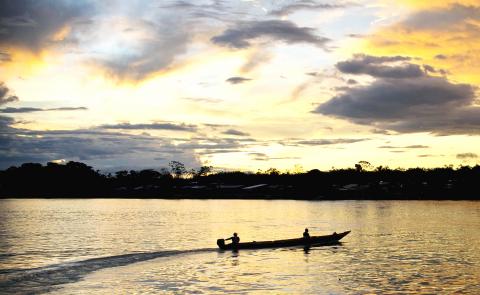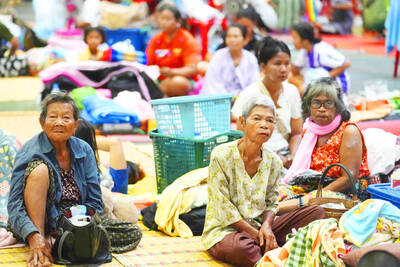Choco, the remote jungle region where the FARC guerrillas captured a prominent Colombian general, is resource-rich, cash-poor and one of the areas hardest hit by 50 years of conflict.
The densely forested department, which sits on the country’s Pacific coast, is a microcosm of the problems fueling Latin America’s oldest conflict.
The poorest region in Colombia, it languishes at the margin of the government’s control, a haven for numerous rebel groups and drug gangs.

Photo: AFP
Las Mercedes, the small village where General Ruben Alzate was captured on Sunday last week with a corporal and an adviser — throwing Colombia’s peace talks into crisis — is a tropical paradise covered in lush vegetation, but lacking running water and electricity.
Locals have been surprised to find themselves thrust into the center of a peace process they say is far removed from their daily reality.
“In Choco, we’re living a different situation than the rest of Colombia. We don’t even realize there are peace negotiations happening,” said Juan Barreto, the Catholic bishop of the regional capital Quibdo. “It’s an isolated region that’s very vulnerable to violence because of its poverty and abandonment by the state.”
The population of Choco is mostly black and more than 60 percent live in poverty.
They mostly survive on fishing, farming and small-scale gold mining.
The dense tropical terrain has made the region a haven for rebels. That plus the proliferation of illegal mining and the good climate for growing coca, the raw ingredient for cocaine, also make it attractive to drug gangs.
Choco has been particularly battered by the five-decade conflict that has killed more than 220,000 people and displaced more than 5 million since the Revolutionary Armed Forces of Colombia’s foundation as a Marxist rebel group in 1964.
This year alone, 8,000 residents have been forced to flee their homes because of violence, according to officials.
“We know how to survive without much here, but now people are afraid to even go out and get food. They’re afraid we’ll be displaced again like in 1999, when the whole village emptied out and we all went to Quibdo,” said Las Mercedes resident Senen Mosquera, 51.
Mosquera was referring to the time an official publicly thanked the local community for helping the military capture nine members of one of Colombia’s since-disbanded paramilitary groups.
The comments sparked attacks by the captured fighters’ comrades that forced the entire village to flee.
Villagers are nervous this history could repeat itself, since the government has said that General Alzate was ambushed by armed guerrillas hidden inside people’s houses.
In Las Mercedes, as in other villages in the area, people interrupt their conversations whenever a motorboat approaches on the river.
In this region of few roads, the Atrato River is the main highway, and attacks, when they come, tend to come from the water.
General Alzate, the head of a task force charged with fighting rebels, drug traffickers and illegal mining in the region, was visiting a civilian energy project by boat when he was captured.
His supporters in the region said Alzate had shown an interest in more than just the military side of the job since being named to the post in December last year.
“Since then he had been traveling around the region and getting to know our reality from the inside,” said Quibdo Mayor Zulia Mena, who said the general could often be seen wearing civilian clothes for such visits, as he was at the time of his capture. “He said his biggest contribution must be to fight injustice.”
However, that is a tall order in Choco, where “whoever has a gun faces off against whoever doesn’t,” said Fanny Salas, a local resident and community leader. “You can’t stop a bullet with words.”

FOREST SITE: A rescue helicopter spotted the burning fuselage of the plane in a forested area, with rescue personnel saying they saw no evidence of survivors A passenger plane carrying nearly 50 people crashed yesterday in a remote spot in Russia’s far eastern region of Amur, with no immediate signs of survivors, authorities said. The aircraft, a twin-propeller Antonov-24 operated by Angara Airlines, was headed to the town of Tynda from the city of Blagoveshchensk when it disappeared from radar at about 1pm. A rescue helicopter later spotted the burning fuselage of the plane on a forested mountain slope about 16km from Tynda. Videos published by Russian investigators showed what appeared to be columns of smoke billowing from the wreckage of the plane in a dense, forested area. Rescuers in

‘ARBITRARY’ CASE: Former DR Congo president Joseph Kabila has maintained his innocence and called the country’s courts an instrument of oppression Former Democratic Republic of the Congo (DR Congo) president Joseph Kabila went on trial in absentia on Friday on charges including treason over alleged support for Rwanda-backed militants, an AFP reporter at the court said. Kabila, who has lived outside the DR Congo for two years, stands accused at a military court of plotting to overthrow the government of Congolese President Felix Tshisekedi — a charge that could yield a death sentence. He also faces charges including homicide, torture and rape linked to the anti-government force M23, the charge sheet said. Other charges include “taking part in an insurrection movement,” “crime against the

POINTING FINGERS: The two countries have accused each other of firing first, with Bangkok accusing Phnom Penh of targeting civilian infrastructure, including a hospital Thai acting Prime Minister Phumtham Wechayachai yesterday warned that cross-border clashes with Cambodia that have uprooted more than 130,000 people “could develop into war,” as the countries traded deadly strikes for a second day. A long-running border dispute erupted into intense fighting with jets, artillery, tanks and ground troops on Thursday, and the UN Security Council was set to hold an emergency meeting on the crisis yesterday. A steady thump of artillery strikes could be heard from the Cambodian side of the border, where the province of Oddar Meanchey reported that one civilian — a 70-year-old man — had been killed and

POLITICAL PATRIARCHS: Recent clashes between Thailand and Cambodia are driven by an escalating feud between rival political families, analysts say The dispute over Thailand and Cambodia’s contested border, which dates back more than a century to disagreements over colonial-era maps, has broken into conflict before. However, the most recent clashes, which erupted on Thursday, have been fueled by another factor: a bitter feud between two powerful political patriarchs. Cambodian Senate President and former prime minister Hun Sen, 72, and former Thai prime minister Thaksin Shinawatra, 76, were once such close friends that they reportedly called one another brothers. Hun Sen has, over the years, supported Thaksin’s family during their long-running power struggle with Thailand’s military. Thaksin and his sister Yingluck stayed